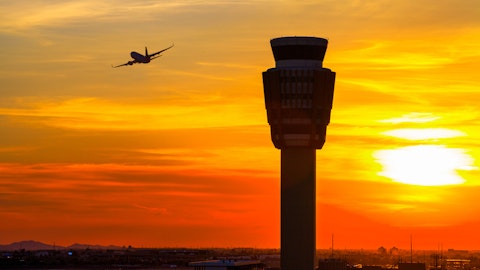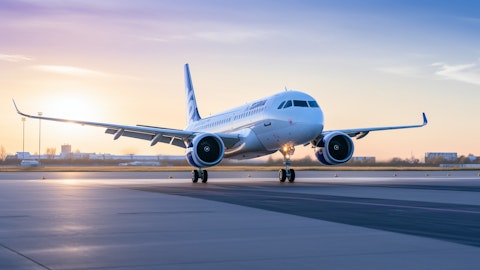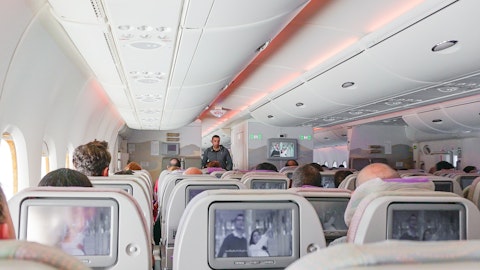Jimmy Dempsey: Sure. Look, like what we’ve seen over the last kind of four or five months is a bottoming of booking trajectory in the early part of Q4, back end of Q3. And then we’ve seen it, as I mentioned in the prepared remarks, we’ve seen a transition to an improving revenue market as we progress through in Q1. And so we’re actually quite encouraged by what we see. We’re obviously working very hard internally in terms of restructuring the network that’s providing a significant improvement as you progress through March, April, May and June. And also, you’re seeing very strong demand in the short-term, improving close-in pricing. So built into our guide is a sequential improvement over the last few quarters on our unit revenues.
Katherine Kallergis: Thank you.
Operator: Thank you. [Operator Instructions] And our next question comes from Brandon Oglenski of Barclays.
Brandon Oglenski: Hey, good morning everyone. Thanks for taking the question. Jimmy, maybe if we can follow up there. So I would assume that you have some acceleration built into your 2Q revenue outlook. Is that what you’re seeing in the bookings? And can you compare and contrast that with Easter holiday timing, not to be too near-term here. But I guess it must be the network changes you’re making that you’re seeing the positive improvements. Is that correct?
Jimmy Dempsey: Yes, yes. I mean we’ve — if you look at the announcements we’ve made recently, you see a big network shift happening March, April, May, June. And that network shift is driving significant improvement in a revenue outturn. Like one of the things that we’re focused on is entering a bigger revenue pool, but also actually in markets that have higher fares. And so that is giving us a better revenue outcome that we’re seeing across the business. It’s early. The big network shift happens during March, April, May and June, as I said. And so we’ll see that progress. But the early signs are very, very good. Obviously, Easter comes back, as you mentioned, into this quarter, and we’ve got to deal with that overall. That’s positive for this quarter.
Obviously, it’s out of April. But we think some of the changes we’re making actually will drive longer-term support for growth in the business, particularly around utilization of peak periods where we’re entering more VFR markets. So…
Brandon Oglenski: And I guess, anticipated in that improvement into 2Q and 3Q, just from where you are in the first quarter, is more of it commercial or revenue based? Or is it also the expectations that your costs can come down and maybe a more controllable operating environment this summer?
Jimmy Dempsey: Well, yes. I mean, look, part of the guide today is clearly our costs are on a very good trajectory. They’re on a different trajectory to the entire industry where our unit costs are actually coming down. Obviously, we stayed adjusted to 1,000 miles just to give you a fair comparison. That’s a really good thing. We’re working very hard in the business on extracting a significant amount of cost out. That’s — a lot of that is driven by the network shift that we’re doing. That helps the business. But what we’re doing is in trying to improve sequential revenue as you progress through this year. Clearly, year-over-year, as you get into the second-half of this year, you have an easier comp from a unit perspective. But what we’re seeing at the moment gives us a lot of hope or optimism around the improving revenue environment as you progress through this year.
Brandon Oglenski: Okay, thank you.
Jimmy Dempsey: Welcome.
Operator: Thank you. [Operator Instructions] And our next question comes from Michael Linenberg of Deutsche Bank.
Michael Linenberg: Hey, good morning, everyone. Hey, I think on the last call, Jimmy, you talked about some of the potential issues that you could have later in the year with the GTF. And I know you had indicated that it was somewhat fluid and you were in conversations with Pratt. Do you have a better sense about any potential groundings that we see later this year, if at all, it’s a 2024 event?
Barry Biffle: Yes, Mike, this is Barry. We expect no financial impact — we expect no financial impact from the GTF.
Michael Linenberg: Okay. Good. And then, Barry, since I have you my second, when I look at your network and I look at some of the routes that you do fly to, I know you’ve topped up VFR, but there are some markets that you’re in where you actually have decent presence in what I would characterize as business markets. I know in the past, you did cater to some price sensitive on the business side, maybe it was 5%, maybe it was 10%. But I’m only bringing this up because when I look at one of your recent offerings, some of your product offerings, there is a bit of a, call it, a business type fair or sort of product that you are rolling out, maybe that’s to take advantage of some of the network changes. Can you talk about that? And maybe there’s some opportunity with your presence in these big markets, Chicago and L.A. and Atlanta and et cetera. Any thoughts on that would be great. Thanks for taking my questions.
Barry Biffle: Sure. So look, I mean, we’re not making a major strategy shift to go after business. I mean, historically, we’ve been in the mid-single digits for business travel. And the majority of those, we believe, are small business. But yes, we’ve heard from our customers, they would like to see kind of a bundled fare available through third-party channels. That’s something we haven’t had in the past. And so we have launched the Biz fare, which includes a bag, carry-on bag. It includes actually premium economy seating if it’s available as well as flexibility, no change cancel fees. So it’s a great product for small businesses. It saves them money. Obviously, we don’t have the frequency that the big airlines do. But I think for some people that want to save money, it’s a great product.
But we just didn’t have anything if they did have a managed travel partnership with a travel agency, we just didn’t have a solution for them, and now we do. And so look, you can kind of do the math. If you just get a few points of this at 30% to 50% higher fare, it’s a great way to diversify our revenues and improve our overall RASM.
Michael Linenberg: Very good. Thank you.



